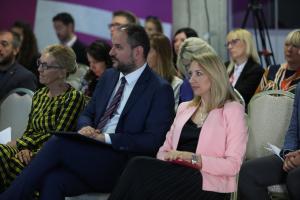
According to the 2023 Global Circularity Gap Report by the Circle Economy Foundation, transitioning to a circular economy will allow us to fulfil people's needs with only 70% of the materials we currently extract and use. The benefits of the circular economy are tremendous, as it not only addresses waste management issues but also drives innovation and creates new business practices and jobs.
Making this systematic change requires rethinking a wide range of aspects: enabling policies, business models, financing, digitalization, trade and traceability in a wide range of activities, including hot spot sectors, such as agri-food and textiles. This highlights the urgency of new partnerships and communication channels among all relevant stakeholders.
“The circular economy model aims to maximize the use of natural resources and minimize the generation of waste, pollution and negative impacts on the environment. However, today’s world is only about 7.2% circular, and we have to ask why?” – noted Mr. Bojan Vranjković, State Secretary of the Ministry of Agriculture, Forestry and Water Management of the Republic of Serbia, welcoming participants of the first in-person meeting of the Circular STEP stakeholder engagement platform, recently held in Belgrade, Serbia.
Organized by UNECE and the Ministry of Environmental Protection of the Republic of Serbia, the meeting gathered government representatives from Eastern and South-East Europe, Caucasus and Central Asia, and created an important connection between countries at the forefront of the circular transformation and those in which circularity is still in the early stages.
The meeting also brought together circular economy actors from academia, civil society and the private sector, including leading networks like the Global Alliance on Circular Economy and Resource Efficiency (GACERE), the One Planet Network, the European Circular Economy Stakeholder Platform, and academic institutions, such as Cambridge University and Exeter University. Think tanks Ellen MacArthur Foundation and Chatham House, as well as institutions empowering economic cooperation and trade, such as the Chamber of Commerce, Circular Change, Finnish Innovation Fund Sitra, contributed their expertise to the discussions, too.
The circular economy transition is high on the agenda in the Republic of Serbia, where UNECE supports activities related to developing the national roadmap on the circular economy transition in the country’s agri-food sector – a sector with high potential for circularity.
The United Nations Office in Serbia finds that 770,000 tons of edible food are wasted or lost in Serbia, 90% of which ends up in landfills. By embracing the circular economy, agricultural waste can be turned into bio-products, such as fertilizers, energy and materials.
“We are committed to integrating circular economy principles in the agri-food sector, encompassing both agriculture and food production, which hold a central place in Serbia’s culture”, said Ms. Sandra Dokic, State Secretary from the Ministry of Environmental Protection of the Republic of Serbia.
Note to editors
UNECE launched its stakeholder engagement platform Circular STEP in April 2022 to accelerate the transition towards a circular economy in member States. Since then, the platform has helped to advance progress on circular economy by bringing together knowledge, expertise, and circular solutions.

